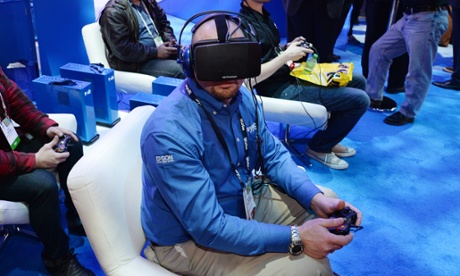
Facebook's purchase of virtual reality company Oculus for $2bn in stocks and shares is big news for a third company: Kickstarter, which today celebrates the first billion-dollar exit of a company formed through the crowdfunding platform.
Oculus raised $2.4m for its Rift headset in September 2012, exceeding its initial fundraising goal by 10 times. It remains one of the largest ever Kickstarter campaigns.
But as news of the acquisition broke Tuesday night, some of the 9,500 people who backed the project for sums of up to $5,000 a piece (the most popular package, containing an early prototype of the Rift, was backed by 5,600 for a more reasonable $300) were rethinking their support.
"I backed the Oculus within the first few days of its entrance on Kickstarter," gamer Rich Wiatrowski told the Guardian. "I thought it was a brilliant idea with what appeared to be capable, passionate individuals behind the creation of the product."
"Although it's not a complete surprise that someone bought Oculus, I can't help but be disappointed finding out it was Facebook… It simply isn't in Facebook's best interest to throw money at something without some control."
George Buckenham, an indie game developer who also backed the Rift on Kickstarter, shares Wiatrowski's concern. "My feelings about the buyout are: irritated… The Face acquisition seems 80% likely to kill their momentum, and even in the 20% chance, it's probably going to get locked down in annoying ways and stop being cool weird tech you can freely hack on."
For Kickstarter itself, the purchase raises awkward questions. The company has always maintained that it should not be viewed as a storefront for pre-ordering products; instead, a backer should be aware that they are giving money to a struggling artist or designer, and view the reward as a thanks rather than a purchase.
"Kickstarter Is Not a Store" is how the New York-based company put it in 2012, shortly after the Oculus Rift campaign closed. Instead, the company explained: "It’s a new way for creators and audiences to work together to make things."
But if Kickstarter isn't a store, and if backers also aren't getting equity in the company which uses their money to build a $2bn business, then what are they actually paying for?
"Structurally I have an issue with it," explains Buckenham, "in that the backer takes on a great deal of risk for relatively little upside and that the energy towards exciting things is formalised into a necessarily cash-based relationship in a way that enforces and extends capitalism into places where it previously didn't have total dominion."
"But I find it hard to take it personally in this case, because I backed it after it was a roaring success and I got my cool bit of electronic junk in about the expected timeframe and in a nifty carry case."
Austin Walker, an academic based at the University of Western Ontario, breaks down the disconnect: "What backers are really upset about, but might not have the words for, is that this makes clear the problem with Kickstarter," he wrote on Twitter after the news broke, "which is that it's about consumption, not investment. Consumers aren't allowed to invest. There's no place for that. So this is a catalyst for (and reflects) a broader frustration about economic opportunities being blocked off to them."
• Sony's project Morpheus is a direct competitor to the Oculus Rift VR headset for the PlayStation 4

